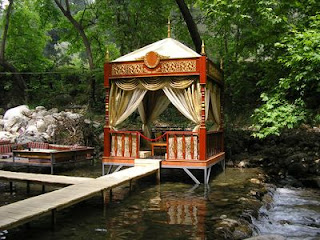
When Anne Elliot and Captain Wentworth at last reach that happy moment when they understand each other and agree to marry, they need somewhere private to walk and talk and pour out their feelings. They set off through the streets of Bath to the Gravel Walk and take their time to go along this quiet way.
Each time I read 'Persuasion' I always imagine their blissful state, strolling slowly arm in arm as they go over the events that have brought them together and then savour the happiness of a shared future. The physical contact is also a thrill, after eight years apart. How I wish I could see them as they walk and stop, chat, move on a little, he catching her arm and pulling her close. Surely, however well bred she is, she is more than ready to snuggle up to him and maybe even exchange a few kisses.
This scene has fascinated me so much that in In All Honour I send my hero and heroine to walk along the same path. Of course, during that walk Greg is overcome by his feelings and by Sarah's beauty, so he cannot help kissing her. At this point Sarah thinks Greg has an understanding with her best friend, Lizzie, so she is upset by the kiss, even though she enjoys it. What a tangle life is!
She leaned closer, closer… Suddenly, both of them recollected where they were and jerked back at the same instant.
Sarah’s cheeks became very red but she kept her eyes on him steadily. She raised a trembling hand to touch her lips. Her breath was coming in little gasps. Greg’s eyes glowed as he watched her and his mouth curved into a breath-taking smile. They stood there, staring at each other, unaware of the wind, the cold and of various nursemaids and servants passing them in both directions.
It seemed a very long time before Sarah said: ‘We should not have done that. It was very wrong of us.’
‘I cannot believe that something so pleasant can be entirely wrong,’ protested Greg. He raised an eyebrow and grinned at her. After a moment in which she continued to stare at him, he added: ‘but if I have distressed you, I apologise.’
She looked down, veiling her eyes with long dark lashes. Her head was whirling. Why had he done it, when he was as good as engaged to her best friend? Why had she responded? And yet, somewhere in her mind, she rejoiced at that sweet contact, oh yes, and she wanted more of it. Which meant she must put herself out of danger, not just from the man she loathed but from the man she loved.
In All Honour, pub: Robert Hale, March 2009
Kindle edition:
Sept 2011
































